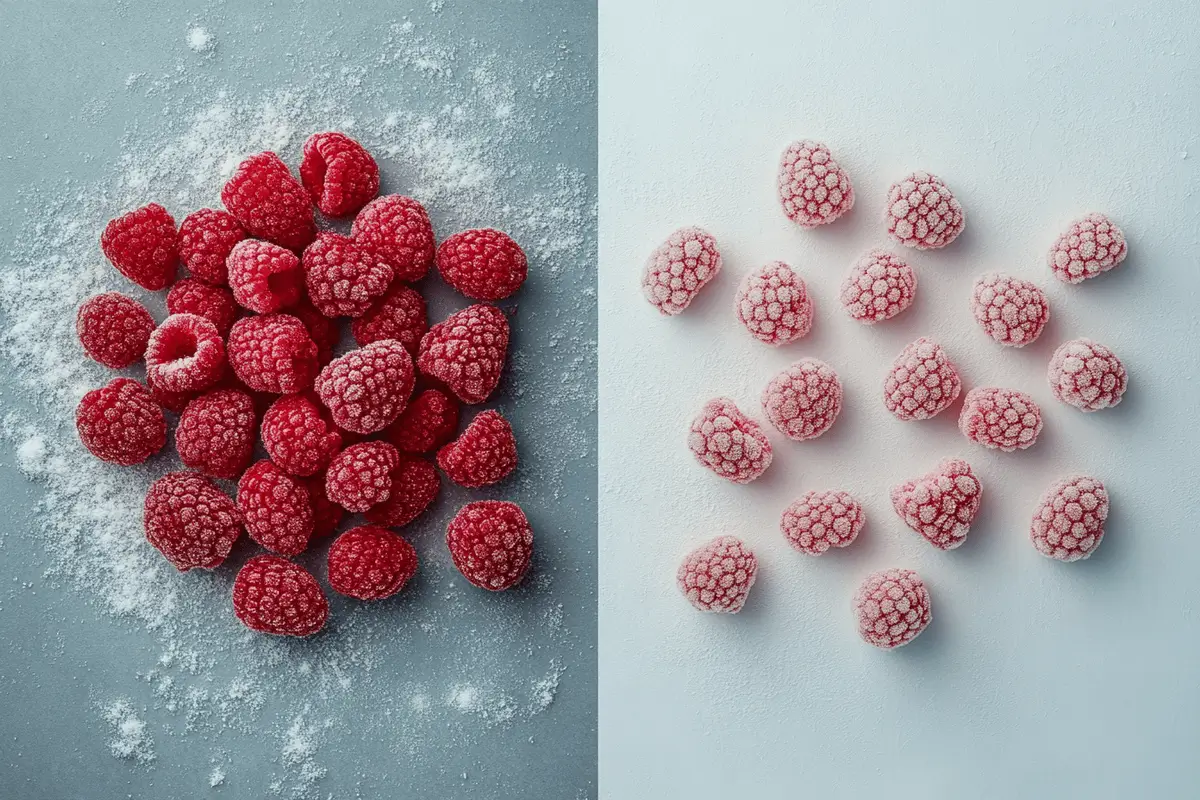Alright, let’s dive into the juicy world of raspberries and figure out if we can swap frozen for freeze-dried! This article will explore the ins and outs of using frozen raspberries when a recipe calls for their freeze-dried counterparts. We’ll unpack the differences between these two forms of raspberries, discuss why recipes often prefer one over the other, and give you practical tips on how to make substitutions work (and when they absolutely won’t). Whether you’re a seasoned baker or a kitchen newbie, get ready to learn if you can you use frozen raspberries instead of freeze-dried cookies in your next culinary adventure!
Table of contents
- Understanding the Differences Between Frozen and Freeze-Dried Raspberries
- When and Why Recipes Call for Freeze-Dried Raspberries
- Exploring the Potential of Using Frozen Raspberries as an Alternative
- Practical Applications and Recipe Examples
- Tips and Tricks for Using Frozen Raspberries Effectively
- The Nutritional Aspect: Frozen vs. Freeze-Dried
- Cost Considerations and Availability
- Conclusion: Making the Right Choice for Your Recipes
- Frequently Asked Questions (FAQs)
Understanding the Differences Between Frozen and Freeze-Dried Raspberries
What Are Frozen Raspberries?
First off, let’s talk about frozen raspberries. These are simply fresh raspberries that have been rapidly chilled and frozen to preserve them. This process is usually done right after harvesting to lock in their flavor and nutritional value. The idea is to keep the berries at their peak, so you can enjoy them even when they’re not in season. They retain a high moisture content, which is key to their juicy texture, and are typically used in things like smoothies, jams, and baked goods where that added liquid isn’t a major issue. Think of them as little icy gems packed with tart goodness.
What Are Freeze-Dried Raspberries?
Now, let’s move onto freeze-dried raspberries. This is where things get a bit more high-tech. Freeze-drying is a process that removes practically all the moisture from the berries, using a method known as lyophilization. Basically, they are frozen, and then the pressure is reduced which allows the ice to turn directly to vapor, skipping the liquid stage. This creates a totally different product from frozen raspberries; they’re lightweight, incredibly crisp, and have a super concentrated flavor. They are usually used in situations where you want intense flavor without adding any liquid like topping for chocolates, meringues or in powders and mixes.
Key Differences: Moisture, Texture, and Flavor
The key differences boil down to moisture, texture, and flavor. Frozen raspberries are plump, juicy, and retain much of their original water content, giving them that soft, slightly icy feel. On the other hand, freeze-dried raspberries are extremely dry and have a light, crunchy texture. Regarding flavor, the freeze-drying process intensifies the raspberry taste, so you’ll get a bigger punch of fruitiness compared to frozen raspberries, which can taste a bit diluted after thawing. Therefore, when a recipe specifies freeze-dried raspberries, it’s often because it relies on these specific properties. In short, can you use frozen raspberries instead of freeze-dried cookies, it will depend on how these differences influence the recipe structure.
When and Why Recipes Call for Freeze-Dried Raspberries

Freeze-dried raspberries being used in a delicate dessert.
The Unique Advantages of Freeze-Dried Raspberries
First, let’s delve into why freeze-dried raspberries are so often favored in certain recipes. Their biggest advantage is undoubtedly their shelf-stability. Since they contain almost no moisture, they can be stored for a long time without spoiling, unlike their frozen counterparts. Additionally, the process of freeze-drying leads to an intense flavor concentration. Think of it like this – you’re removing all the water, leaving behind only the purest raspberry essence. Also, they’re incredibly light and crisp, qualities that make them perfect for certain applications where adding more moisture and weight is undesirable. It is these unique characteristics that make freeze-dried raspberries a favorite among bakers and confectioners.
Common Uses for Freeze-Dried Raspberries
Therefore, freeze-dried raspberries are incredibly versatile. You’ll often see them used in baking, particularly in delicate items like dustings, meringues, and as inclusions where you want the flavor of the fruit without adding wetness. In the world of confectionary, they’re often used in chocolate coatings and for decorating desserts because they don’t bleed moisture. Furthermore, they can easily be ground into powders to add flavor boosts to dry mixes, beverages, and so on. They offer an elegant touch and intense burst of flavor that’s hard to replicate with other forms of raspberries.
Why Frozen Raspberries Don’t Always Work
However, frozen raspberries, while delicious, don’t always play well in these scenarios. For example, when you’re trying to create something with a delicate structure, like a meringue, adding the moisture from frozen raspberries can be a complete disaster. They can cause the meringue to collapse. In baking, extra liquid can alter the intended texture of the recipe, leading to soggy bottoms and uneven baking. Moreover, if not handled carefully, the excess water content from frozen raspberries can also impact the flavor as the water will dilute the sweetness, leaving you with a less-than-ideal result. Hence, can you use frozen raspberries instead of freeze-dried cookies depends on how much moisture the recipe can tolerate.
Exploring the Potential of Using Frozen Raspberries as an Alternative
Can You Substitute Frozen Raspberries For Freeze-Dried?
Now, here’s the big question: Can you use frozen raspberries instead of freeze-dried cookies? Well, it’s not a straight yes or no. In some situations, yes, you can make a substitution, but it requires careful consideration. It totally depends on the recipe’s requirements. Generally, if a recipe relies heavily on the dryness of the freeze-dried raspberries, it’s probably not going to be a good idea to make the swap. However, if the moisture won’t throw things off too much, you have some wiggle room.
Specific Recipe Adjustments When Substituting
If you decide to attempt the substitution, be prepared to make some adjustments. Primarily, you’ll need to focus on minimizing the moisture from frozen raspberries. One way to do this is by thawing them completely, then draining them very well. You might even consider using a cheesecloth to squeeze out the extra liquid. Moreover, it’s beneficial to understand the flavor difference. Because frozen raspberries have a more diluted flavor due to their water content, you might need to adjust other ingredients to maintain the desired intensity.
When Frozen Raspberries Are a Great Option
On the flip side, there are many times when using frozen raspberries works wonderfully. For instance, in things like smoothies, jams, and sauces, the added moisture isn’t a problem, it’s actually a benefit. And, in baking applications such as muffins, cakes, or pies, the added moisture can sometimes make things more tender and moist. Also, when you make a raspberry compote, a frozen raspberry works as well as a fresh one. It all comes down to understanding how moisture impacts the final result. Finally, you need to know when the substitution won’t ruin your creation.
Practical Applications and Recipe Examples

Homemade muffins baked with frozen raspberries.
Recipes Where Frozen Raspberries Can Work Well
So, when can you confidently reach for frozen raspberries instead of freeze-dried? Well, as mentioned, they shine in recipes where their moisture content isn’t a drawback. For example, they’re fantastic in muffins and quick bread. The added moisture can help make these treats extra tender. Similarly, using them to make a raspberry compote or various sauces is a great way to utilize frozen berries, as these recipes are designed to handle the extra liquid. Additionally, blending frozen raspberries into smoothies and beverages is a no-brainer; they’ll give you that delicious flavor and that frosty touch. It’s where their natural texture and flavor can be best appreciated.
Recipes Where Frozen Raspberries Should Be Avoided
On the other hand, there are times when frozen raspberries should be avoided like the plague. Delicate pastries such as meringues and macarons are prime examples. These recipes depend on precise ingredient ratios and specific textures, and the extra moisture from frozen raspberries will completely ruin them. Also, if you are making recipes that specifically call for the dryness and the concentrated flavor of the freeze-dried raspberries then replacing them with frozen ones is a big no-no. Therefore, it’s really about knowing which recipes are more forgiving than others, and where the moisture level plays a crucial role.
Real-Life Testing: Frozen vs. Freeze-Dried Results
Let’s talk about what happens when we actually put this to the test. If you try baking two batches of the same recipe, one with frozen raspberries and one with freeze-dried, you’ll probably see some differences in the end result. Visually, the batch with frozen raspberries might be a bit wetter and the berries might bleed their color more. Furthermore, the texture will likely be less airy, compared to the recipe using freeze-dried raspberries which will be lighter and crispier. And, of course, there is a flavor difference. The one with freeze-dried raspberries will typically have that intense raspberry taste. Thus, if you were to ask can you use frozen raspberries instead of freeze-dried cookies, the answer would be: it depends on what kind of cookies you’re making.
Tips and Tricks for Using Frozen Raspberries Effectively
Proper Thawing Techniques for Frozen Raspberries
If you’re going to attempt to swap frozen raspberries for freeze-dried, you have to know how to handle them properly. The first thing to focus on is thawing. Avoid thawing them in hot water as this can make them mushy. Instead, thaw them gently in the refrigerator or at room temperature. Furthermore, you can also place them in a colander to help them drain a bit as they thaw. The goal here is to minimize the amount of water they retain, keeping them from turning into a soggy mess.
How to Drain Excess Moisture From Frozen Raspberries
Once thawed, you need to get rid of any excess water. This is crucial when using them in baking. To drain them properly, place the thawed raspberries in a fine-mesh sieve or colander. Next, you can gently press on them with the back of a spoon to squeeze out any extra liquid. For even more effective draining, you could wrap them in a cheesecloth and squeeze out the water. This extra step can make a big difference in the final outcome of your recipe.
Preserving Flavor and Color When Baking with Frozen Raspberries
Finally, let’s talk about preserving that flavor and color. When baking with frozen raspberries, color bleed can sometimes be an issue. To prevent this, try lightly coating the berries with a bit of flour before adding them to your batter. This will help the berries maintain their shape and color during the baking process. Furthermore, to retain that intense raspberry flavor, consider adding a touch of lemon juice or a small amount of raspberry extract to enhance their natural taste. By following these tips, you can use frozen berries successfully without sacrificing either flavor or appearance.
For more baking tips and tricks, check out our article on Baking basics.
The Nutritional Aspect: Frozen vs. Freeze-Dried
Nutritional Comparison of Frozen and Freeze-Dried Raspberries
Let’s shift our focus to the nutritional side of things. Both frozen raspberries and freeze-dried raspberries are packed with goodness, but the way they are processed can impact their nutrient levels. Frozen raspberries generally retain more of their original vitamin and mineral content, because the freezing process is relatively gentle and doesn’t break down nutrients. Additionally, they are good sources of fiber and antioxidants which are important for our well-being. So, if you’re looking for a healthy option, either form of raspberry is a smart choice.
Impact of Processing on Nutritional Value
However, the processing does have some impact. With freeze-dried raspberries, although the process removes almost all the water, it is designed to help keep the nutritional value. Because they are processed under low temperatures, many of the vitamins, minerals, and antioxidants remain intact, even though some water-soluble vitamins like Vitamin C might be slightly reduced. Still, the freeze-drying process typically does a good job of preserving most of the beneficial compounds. Therefore, the slight reduction in some nutrients is often offset by the convenience and intense flavor that freeze-dried raspberries offer. If you’re wondering can you use frozen raspberries instead of freeze-dried cookies from a nutritional standpoint, you’re not losing a great deal in either direction.
Cost Considerations and Availability
Price Comparison: Frozen vs. Freeze-Dried Raspberries
Now, let’s talk about your wallet. Typically, frozen raspberries are significantly more affordable than freeze-dried raspberries. This is primarily due to the differences in processing methods. The freeze-drying process requires specialized equipment and more energy, which bumps up the price. Also, frozen raspberries are produced on a larger scale. So, if budget is a big concern, frozen raspberries are generally the more economical choice. You can find them in most grocery stores in the frozen section. On the other hand, freeze-dried raspberries often come with a premium price tag due to their unique properties.
Availability of Frozen and Freeze-Dried Raspberries
In terms of availability, you’ll usually find frozen raspberries year-round in almost every grocery store. They are widely accessible and easy to find. Freeze-dried raspberries, however, might not be as readily available. You’ll likely find them in specialty stores, health food stores, or online retailers. While they might be slightly harder to find, online shops make purchasing them easier than ever before. Consequently, knowing what you have access to is important. Finally, whether you opt for frozen raspberries or freeze-dried, depends on your budget, the availability where you are, and how you plan on using them. If you were to ask can you use frozen raspberries instead of freeze-dried cookies, you’d need to consider your budget constraints as well.
Conclusion: Making the Right Choice for Your Recipes
Summarizing the Key Differences and Best Use Cases
So, to recap, frozen raspberries and freeze-dried raspberries are quite different, and each has its own best use cases. Frozen raspberries are juicy, retain their natural moisture content, and are best in situations where that extra liquid isn’t a problem, like in smoothies, sauces, or certain baked goods. On the flip side, freeze-dried raspberries are dry, crisp, and offer an intense flavor punch. They shine in delicate recipes where extra moisture could ruin things, such as in meringues or macarons, and for decorative purposes. Ultimately, the choice between the two comes down to the specific demands of your recipe.
Final Recommendations on Substituting Frozen for Freeze-Dried
Ultimately, can you use frozen raspberries instead of freeze-dried cookies? The answer, as we’ve seen, is a bit complex. Substituting frozen raspberries for freeze-dried isn’t always straightforward, and it really requires careful consideration of the recipe. If a recipe explicitly calls for freeze-dried raspberries, it’s usually for a good reason. However, in some instances, such as in less delicate baked goods or in recipes where moisture is not an issue, with the right adjustments, you can achieve great results by swapping the frozen raspberries. Just remember to thaw and drain them well, and you may need to tweak other ingredients to make up for the difference in flavor and texture.
Frequently Asked Questions (FAQs)
No. Frozen raspberries are just frozen fresh, retaining water. Freeze-dried raspberries have nearly all moisture removed, becoming dry and crisp.
The main difference is water content. Frozen has high moisture; freeze-dried is almost completely dry.
Yes, in many baked goods like muffins and pies. Be aware that the extra moisture can alter the texture.
Adjust recipes for extra moisture from frozen raspberries. You may need to reduce liquid or coat them in flour.
Not ideally. Fresh raspberries add more moisture and will alter the recipe results where freeze-dried are needed.
If substituting, reduce liquids and drain fresh raspberries. The result won’t have the same dryness or flavor intensity.
Frozen fruit is simply frozen, retaining water. Freeze-dried fruit has moisture removed, becoming crisp with a concentrated flavor.
Frozen preserves fruit’s state; freeze-dried removes moisture, altering texture, and intensifying flavor.

